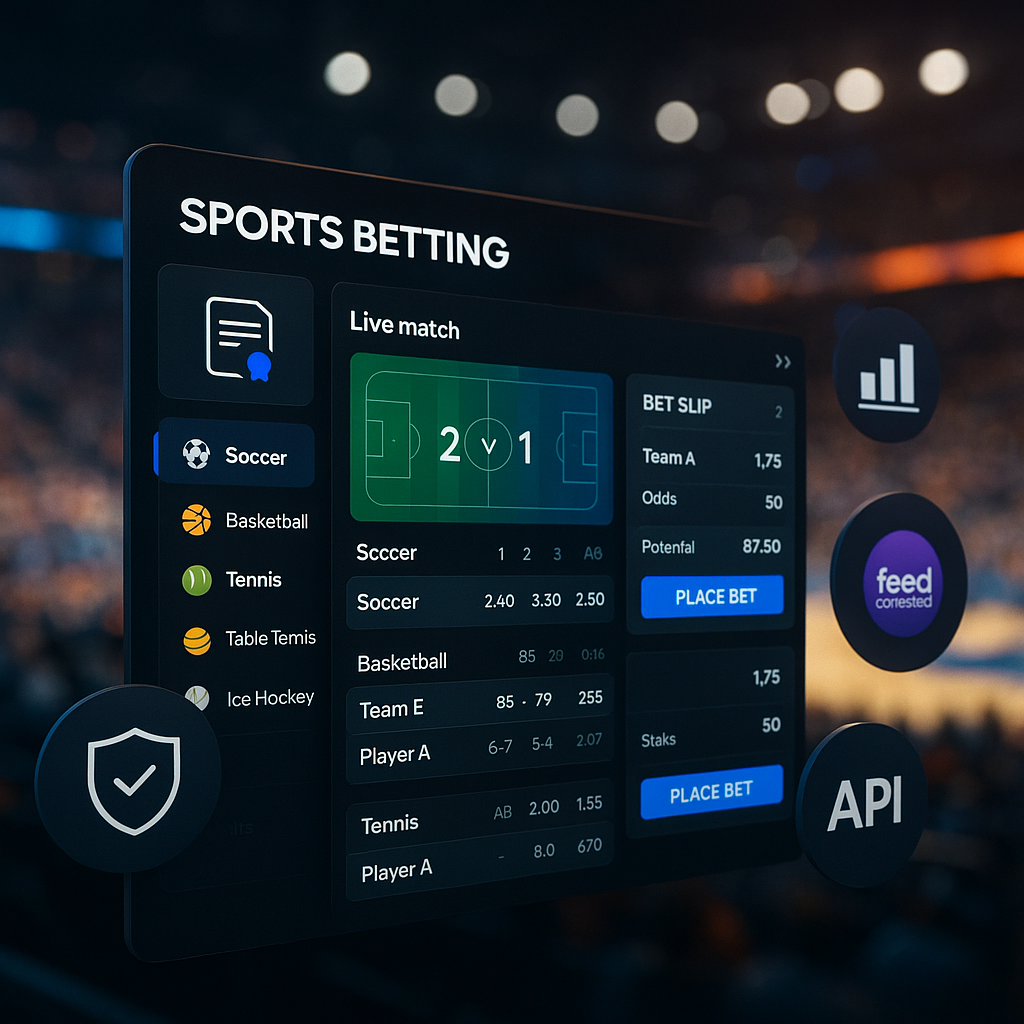Integrate FeedConstruct Sports Betting API: Step-by-Step Guide
Read Time 4 mins | Written by: Kostia L

Overview
FeedConstruct is a dynamic iGaming technology provider specializing in real-time data and odds solutions. The feedconstruct sports betting api enables operators to integrate a wide range of pre-match and live sports events into their gaming platforms with minimal latency and exceptional accuracy. Designed for scalability, automation, and global relevance, this API supports operators seeking premium content and seamless operations.
Business Benefits
- Revenue impact: Real-time odds and broad sports coverage boost bet volume and margins, unlocking new monetization opportunities across markets.
- Player retention: Advanced in-play features, fast data latency, and expansive sports coverage keep players engaged and loyal over time.
- Brand differentiation: Offer exclusive data feeds and unique betting options that distinguish your platform from competitors using generic APIs.
- Operational efficiency: With a robust integration guide, thorough setup documentation, and clear API version control, deployment is streamlined and error-resistant.
- Regulatory coverage: Gain access to region-specific data and betting types, supporting compliance within fully licensed jurisdictions including the EU, UK, and MGA-regulated territories.
Prerequisites
Before diving into API integration, ensure your platform has stable server infrastructure and secure hosting with SSL encryption. Redundant systems, disaster recovery measures, and DDoS protection are also important to handle peak traffic and ensure uninterrupted operation during high-volume events.
You will need access to a development team familiar with RESTful API concepts and JSON formatting standards. Understanding OAuth 2.0 authentication processes is also essential, as this protocol governs secure token exchanges required during implementation and user session validation.
Additionally, ensure your platform complies with standard licensing and responsible gaming policies. Legal due diligence is mandatory when integrating sports betting data, especially when targeting multiple regions with varying gambling laws and regulatory expectations.
Step-by-Step Integration
Step 1: Contract & Credentials
Begin by finalizing a commercial agreement with FeedConstruct which will grant you access credentials—these include your API key and shared secrets. These identifiers authorize access to the API endpoints and define your account-specific usage limits, markets, and event types included in your package. Keep credentials secure and never expose them in front-end code or browser environments.
Step 2: Environment Setup
Configure your staging and production environments to securely handle API requests and responses. Staging should mimic your live environment as closely as possible, including firewall rules, networking protocols, and DNS configurations. Logging, timeout handling, and retry logic should also be prepared to accommodate real-time sporting data traffic.
Step 3: Secure Token Exchange
Use your API key and secret at the authentication endpoint to request your initial bearer access token. This token must be passed with every subsequent API request. Keep in mind that tokens expire after a defined time and must be refreshed securely. Automating the refresh process prevents session drops and accommodates long user sessions.
Step 4: Game Catalogue Sync
Pull the available sports, leagues, and events using the game catalogue route to populate your frontend. This should be done regularly via scheduled jobs to reconcile any new events, start times, or odds changes. Filter content dynamically by market or timezone to serve localized experiences and reduce unnecessary data load.
Step 5: Wallet Hooks
Implement wallet debit and credit hooks to synchronize user balances before and after bets. Each transaction should include checksum verification and a unique identifier to prevent duplication or fraud. Real-time error reporting is critical here to prevent user disputes and authorize immediate resolution actions.
Step 6: QA & Certification
After development is complete, perform standard QA test routines against the staging API. FeedConstruct may require sandbox matches or odds events to validate your implementation. Once verified, acquire any licensing body’s technical certification required to go live in regulated environments you intend to serve.
Core API Capabilities
- Authentication & session control
- Dynamic game catalogue retrieval
- Financial transaction hooks
- Real-time event streaming
- Operator analytics & reporting
Testing & QA Checklist
- Unit tests for every financial call.
- Load test at peak concurrency.
- Fail-over simulation.
- Regulator log review.
Common Pitfalls
- Token refresh timing issues.
- Currency decimal mismatch.
- Under-provisioned live-dealer bandwidth.
- Incomplete event subscriptions.
Scaling & Performance Tips
Design your backend to support autoscaling during major sporting events. Use cloud infrastructure where instance count can adapt dynamically. Separate services via microservices or containers to isolate load issues before they affect other areas.
Implement intelligent caching for frequently accessed markets and avoid repetitive catalog syncs in short intervals. Add monitoring tools for API error rates, latency, and uptime. Alerting on critical failures ensures your team responds fast to prevent downtime or user-facing issues.
Compliance & Licensing
Compliance begins with understanding your target jurisdictions and interpreting API operations through regulation-safe logic. FeedConstruct’s thorough integration guide, together with robust documentation, facilitates easier licensing audits and technical inspections required for operating in regulated regions.
How We Can Help
Our team handles every step of your FeedConstruct API rollout from documentation to certification with a done-for-you approach.
FAQ
Q1: How fast is the API response time?
A: Most endpoints respond in under 300 ms, ensuring seamless user experiences.
Q2: Can we customize available sports or betting types?
A: Yes, FeedConstruct allows configuration of markets to suit target demographics.
Q3: Do tokens expire automatically?
A: Yes. Tokens expire and require a secure refresh mechanism in your integration.
Q4: Is there a sandbox environment for staging?
A: Yes. A sandbox is available to test all endpoints without real financial risk.
Q5: Can this API support mobile apps?
A: Absolutely. The REST architecture supports full mobile client-side integrations.
Next Steps
Ready to fast-track your sports betting platform? Let us walk you through every detail of your FeedConstruct API integration, from setup to launch—reach out now.
.png?width=161&height=70&name=bm-positive%20(1).png)